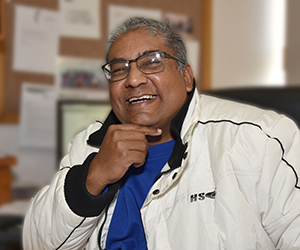Latest News Archive
Please select Category, Year, and then Month to display items
12 October 2020
|
Story Arina Engelbrecht
|
Photo Supplied
 Arina Engelbrecht from Organisational Development and Employee Well-being believes physical activity has a number of benefits for one’s health, including stress relief.
Arina Engelbrecht from Organisational Development and Employee Well-being believes physical activity has a number of benefits for one’s health, including stress relief.
Being physically active plays a big role in preventing the development of mental-health problems and in improving the quality of life of people experiencing mental-health problems.
Treatment for depression
Physical activity can be an alternative treatment for depression. It can be used as a stand-alone treatment or in combination with medication and/or psychological therapy. It promotes all kinds of changes in the brain, including neural growth, reduced inflammation, and new activity patterns are formed that promote feelings of calm and well-being. It releases endorphins – powerful chemicals in the brain that energise your spirit and make you feel good.
Physical activity can be very effective in relieving stress. Research in adults has found that physically active individuals tend to have lower stress levels compared to individuals who are less active. It also leads to improved sleep. When a person sleeps better and feels more rested, overall quality of life improves. They cope better with daily life stressors.
Reduce Alzheimer's risk
Regular physical activity can reduce your risk of developing Alzheimer's disease by up to 50%. It can also slow down further deterioration in those who have already started to develop cognitive problems. It stimulates the brain’s ability to maintain old connections as well as to make new ones.
A study asked people to rate their mood immediately after periods of physical activity (e.g. going for a walk/run, cycling, doing housework) and periods of inactivity (e.g. reading a book or watching television). Researchers found that participants felt more content, more awake, and calmer after being physically active compared to after periods of inactivity.
In conclusion, people who are physically active feel a sense of well-being, feel more energetic throughout the day, sleep better at night, have sharper memories, and feel more relaxed and positive about themselves and their lives.
“Being physically active not only changes your body, it changes your mind,
attitude, and your mood.” – Arina Engelbrecht
UFS Professor on his new book on Boko Haram
2017-02-01

Prof Hussein Solomon, Senior Professor
in the Department of Political Studies and
Governance at the UFS and co-editor of the
book titled Understanding Boko Haram:
Terrorism and Insurgency in Africa.
Photo: Charl Devenish
Understanding the nature of the Boko Haram insurgency in northeast Nigeria is exactly what Prof Hussein Solomon from the Department of Political Studies and Governance at the University of the Free State (UFS) has set out to do.
Understanding the emergence of Boko Haram
Prof Solomon says tens of thousands of people have been killed in northeast Nigeria and neighbouring states as a result of the violence unleashed by the terrorist group. With the help of his co-editor, Prof Jim Hentz, who is an army colonel and lecturer at the Virginia Military Institute in the US, they set out to “understand the emergence of Boko Haram in a historical, sociological, economic and political context”.
In his book, titled Understanding Boko Haram: Terrorism and Insurgency in Africa, Prof Solomon “seeks to understand the emergence of Boko Haram in a historical, sociological, economic and political context”.
Book launch to take place in Chicago in the US
In his previous book, Islamic State and the Coming Global Confrontation, he analyses the origins and organisational structure of the Islamic State. Although an entirely new topic, but within the broad theme of political Islam, this book focuses more on how Boko Haram has become part of the Islamic State’s franchise in West Africa.
The book, which took more than a year to write, is based on secondary research, followed by primary documents and interviews done on the ground in Nigeria. It will be of much interest to students of terrorism and political violence, insurgencies, African politics, war and conflict studies, and international relations in general.
The official launch will take place at the African Studies Association’s annual meeting and takes place from 16-18 November 2017, in Chicago in the US.